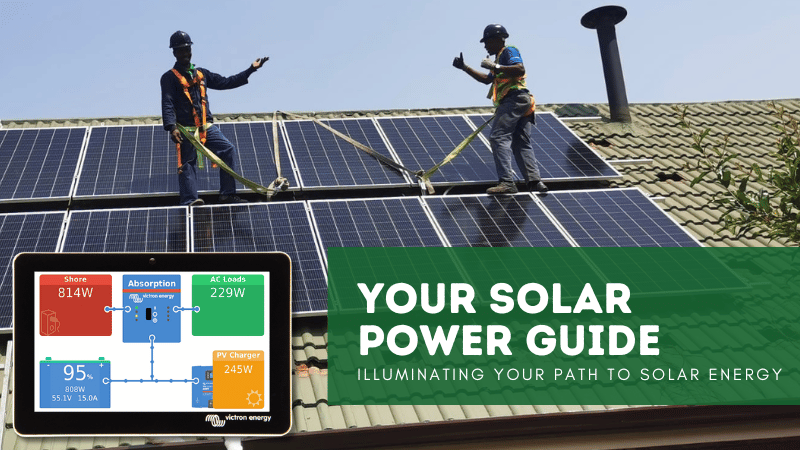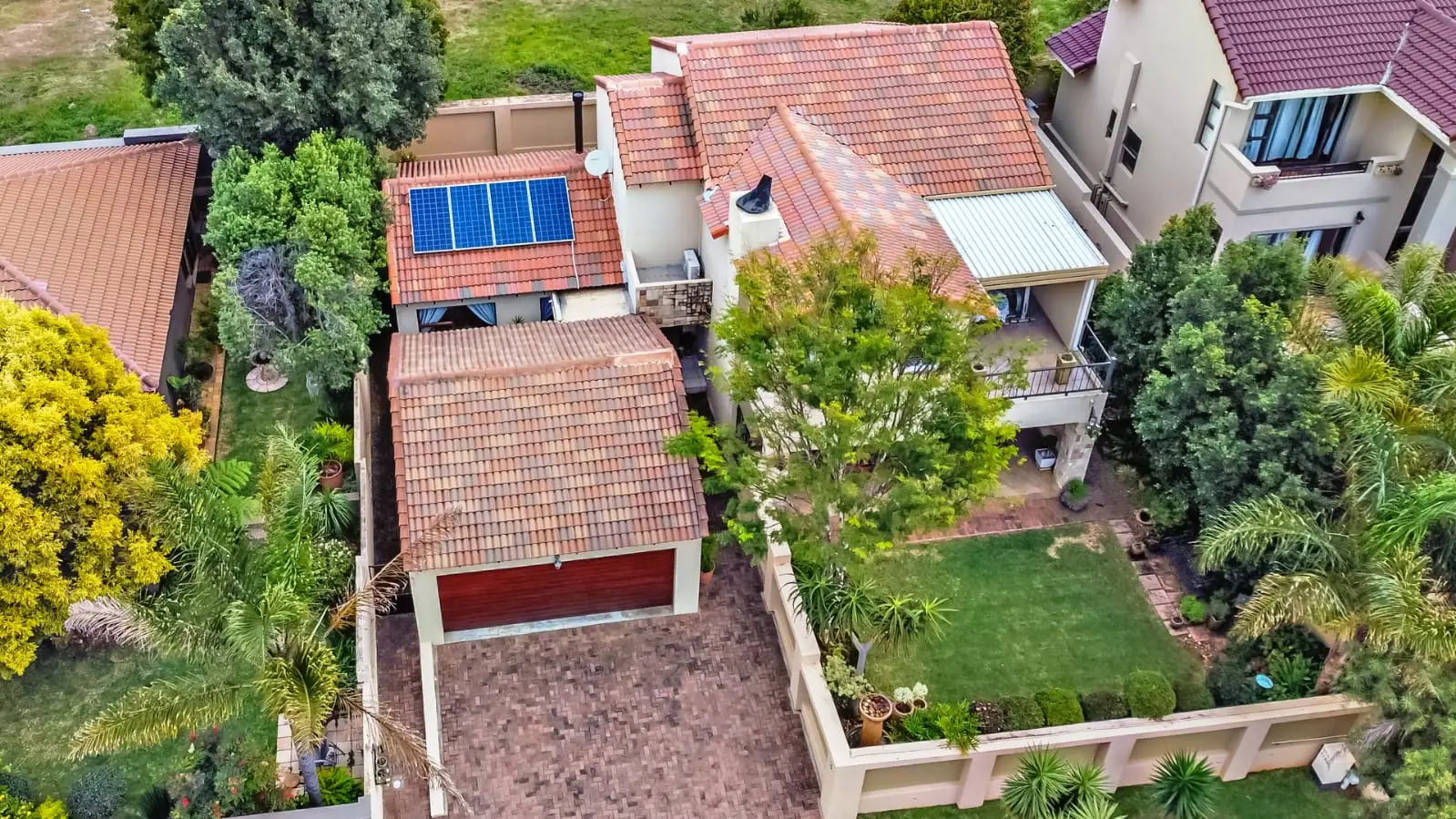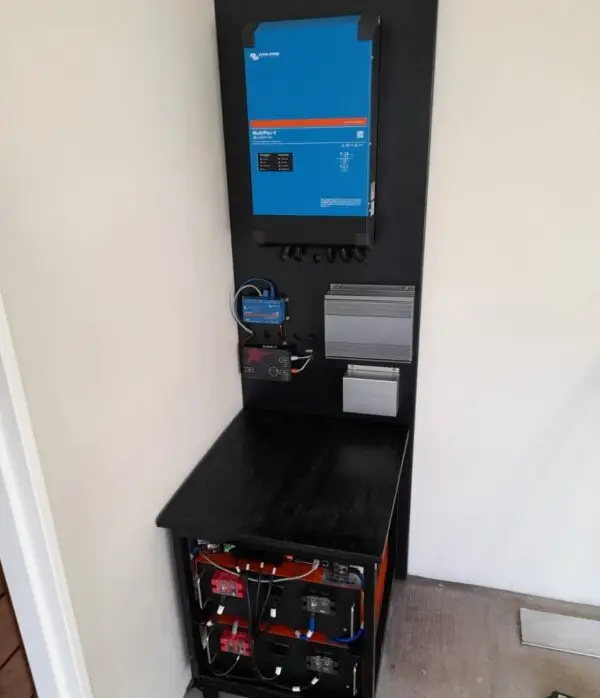Solar 101: The Basics It’s all about catching those rays! Solar panels convert sunlight (not heat) into DC power. Picture this: A 300w panel soaking up the sun for an hour can produce up to 300w of energy. In sunny Johannesburg, you’re looking at 4-6 peak sun hours daily. Positioning is key – north-facing in the Southern Hemisphere for max sun exposure. Power from the panels goes to the charge controller which manages the charging of the batteries. Solar panels produce DC power, your battery stores DC power, but your home appliances run on AC power. The inverter converts DC power of the panels and batteries to AC power that feeds your home’s Distribution Board, from here it can be used by your home appliances.
Picking Your Solar System What’s your goal with solar? Be it dodging load shedding, trimming the electricity bill, or going green, here’s what’s on offer:
- Off-Grid: Total Eskom independence. Needs hefty battery storage for cloudy days and nights (or an additional generator). Pricey, yes (around R200,000 – R300,000) but say goodbye to grid dependence.
- Grid-Tied: You’re still on the Eskom grid, no batteries needed. Your panels power your appliances directly, reducing bills. Best for daytime power users. When there is loadshedding the system shuts off. Not very popular with the current level of loadshedding we are experiencing. Cost range: R30,000 – R150,000
- Hybrid: The best of both worlds. Smaller battery bank for load shedding relief, and you save during sunny hours. A hit in SA, priced between R80,000 – R250,000 depending on usage.
- Backup System: Just batteries & an inverter, charged from the grid, kicking in during outages. Most wallet-friendly but no daily savings. Costs between R25,000 – R100,000.
Energy Efficiency is Key Before jumping into solar, consider reducing your energy appetite. Think swapping to a solar/gas geyser, gas stove, and LED lights. High power appliances like heaters aren’t great for solar. Efficiency first means a smaller, more affordable solar setup later.
How Much Power Do You Need? The best way to nail this is with an energy meter (like a SCOUT) at home for a couple of weeks. It shows your total and peak use. Armed with this, your installer can craft the perfect system for you.
Solar Panels and Placement Got a north-facing roof? Perfect for panels in South Africa. Avoid shade – it’s a solar power killer, dropping panel efficiency significantly. East & west can be used, but we need to compensate with the sizing of the solar array.
Choosing the Right Installer This is a big investment. Look for an installer with solid experience (5+ years), good references, a PV Green Card, and association with groups like SAPVIA. Avoid newbies or shoddy workmanship -a lot of these guys have entered the market in the last few years. We have a 13-year track record.
Guarantees and Warranties Quality solar parts come with solid guarantees. Expect around 5 to 10 years for inverters and chargers, 10 years for lithium batteries, and 25-30 years for tier 1 panels.
Battery Life and Cycles Not all batteries are created equal. Their lifespan is measured in cycles. Don’t just look at the capacity; consider how many cycles they offer for the price. If you want to dive deepr look at they type of cell that is used in the battery. A popular option is CATL.
Brand Matters Do your homework on the brands your installer suggests. Look for long-standing reputations, solid warranties, and real-world reviews.
Monitoring Your System Think of it like your car’s dashboard. Monitoring helps ensure optimal performance and alerts you to issues before they become big problems. It also helps you maximise your Return on Investment.
What Works with Solar Not everything is solar-friendly. Heavy electricity users like geysers and stoves can strain your system (if the system was not designed to accommodate these appliances). Your installer can guide you on what’s best.
Safety First Proper installation with all the safety bells and whistles (fuses, breakers, surge arrestors, etc.) is crucial. Ensure a master electrician signs off for your peace of mind. The devil is in the detail, high quality AC & DC protection will keep your home and family safe.
Financing Your Solar Project Most banks offer solar loans. Best to chat with your banker for specifics.
Tax Incentives for Businesses Companies, take note! Solar installations come with tax perks. Check out Section 12B of the Income Tax Act for details on accelerated depreciation allowances.
Hoping this sheds light on the solar path for you! Remember, a trustworthy installer, knowing your power needs, and opting for quality equipment are key for a solar system that shines.
Any questions, or if you’re ready to take the next step, give us a ring at the Cedar Solar Team on 011 794 4664, or email at [email protected]. Find out more at www.cedarsolar.com. Here’s to your solar journey!




